Huckin' Eh's inaugural Canadian D1 College awards celebrating the best of the best in 2022.
November 24, 2022 by Theo Wan and Danie Proby in Awards with 0 comments
Guest author Sarah Pledge-Dickson also contributed to reporting.
With the college season now in the rearview, it’s time to take a look at the best and brightest in Canadian university ultimate. The University of Manitoba had a banner season for Winnipeg, securing a university open title along with junior open club and senior open club victories earlier this year. An upstart Ottawa squad made it to the CUUC final, improving on an eighth place finish the season prior.
In an effort to continue to shine a spotlight on the upcoming talent in Canada, the Huckin’ Eh D1 College Awards were born. Every team in Division 1 nominated a player in each category before the awards were then voted on by the other teams in the division. We couldn’t be more proud to honor these award winners.
Want to know who’s going to tear it up in club and represent Team Canada in the next few years? Look no further than the list below!
Player of the Year
Nick McFaddin (Manitoba)
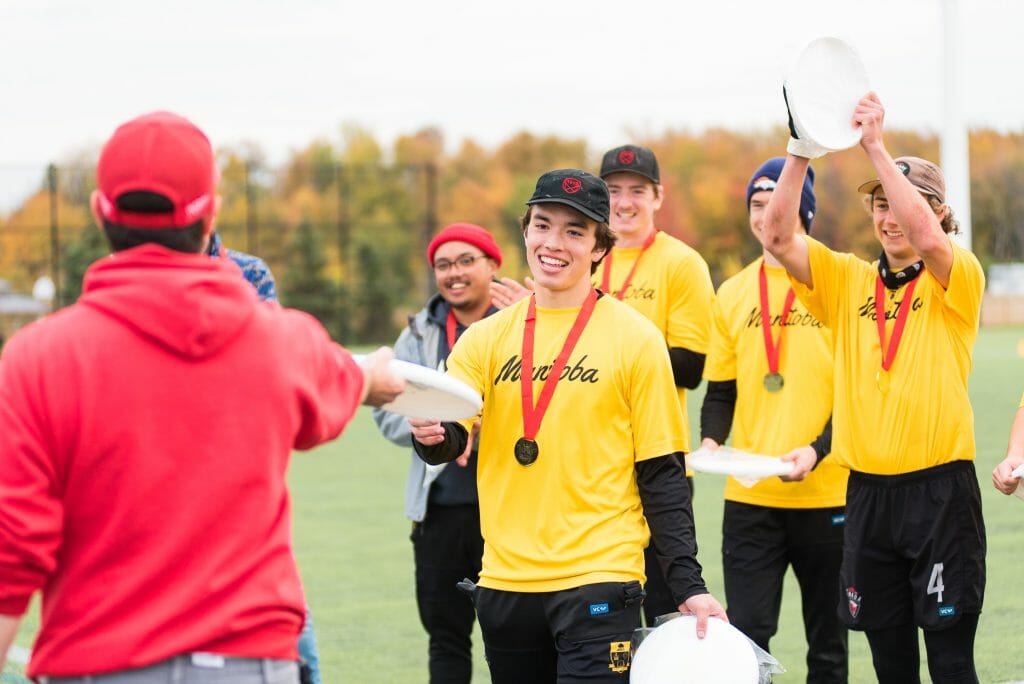
Nick McFaddin was named one of the Manitoba team captains in only the second year of his university career. With two captains departing after this year, they wanted to pass on the torch to someone who could lead the team and build the next version of the dynasty. Well, there isn’t a better way to start off than with an MVP award for his performance in the final and a gold medal.
McFaddin stepped up in a big way this year, growing into his leadership role in practices by teaching schemes, holding people to a high standard, and pushing himself to be the best he could. Throughout CUUC the team relied heavily on him as the main O-line handler, as well as to crossover and generate turns on defense. He has the ability to go every other down the field with an elite first step. Other teams struggled to contain his elite first step, leading to full-field give-and-gos for easy tic-tac-toe scores. On defense his play calls helped to orchestrate looks that resulted in key turns. His game IQ is his biggest asset and he thinks quicker than anyone on the field. Even after playing nearly every point in several different games, his stamina was never in question as he walked straight back to the line. He was an integral part of the team and if Manitoba is to repeat next year, McFaddin will be a large reason why.
First Runner-Up
Scott Graham (Waterloo)
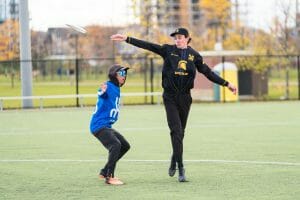
Waterloo believes the Player of the Year should be someone who not only makes exceptional individual plays, but in doing so elevates their entire team’s level of play. Scott Graham undeniably satisfies both of these criteria. To say that Graham is the backbone of the University of Waterloo’s open program would be an understatement: he’s spent five years elevating the program from Div 2 to Div 1, winning some big upsets along the way. He both sets his teammates up for success and bails them out when they make mistakes. On offense, his combination of height, athleticism, disc control, and ultimate brains made him every university D-line’s worst nightmare. If the offense does turn it over, more often than not Graham recovers the disc with a poach block or a sky battle with someone else’s match up.
Second Runner-Up
Cam Kennedy (Ottawa)
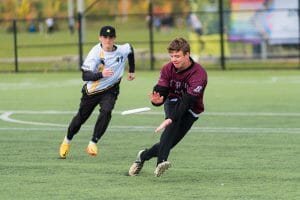
Cam Kennedy was an integral part of all aspects of Ottawa’s game this season. Whether Ottawa needed someone to break up a huck-and-pin (the McGill special), make a game-saving play in 30 km/h winds, or play ferocious one-on-one defense against top cutters, Kennedy was Ottawa’s guy. Whether he was chucking discs from the endzone, coming down with every stall nine prayer, or going every-other on universe point, he was an unstoppable force. His experience with the AUDL’s Ottawa Outlaws elevated Kennedy’s game and allowed him to be the dominant leader and player this past season for the silver medalist Ottawa Gee-Gees.
Offensive Player of the Year
Nick McFaddin (Manitoba)
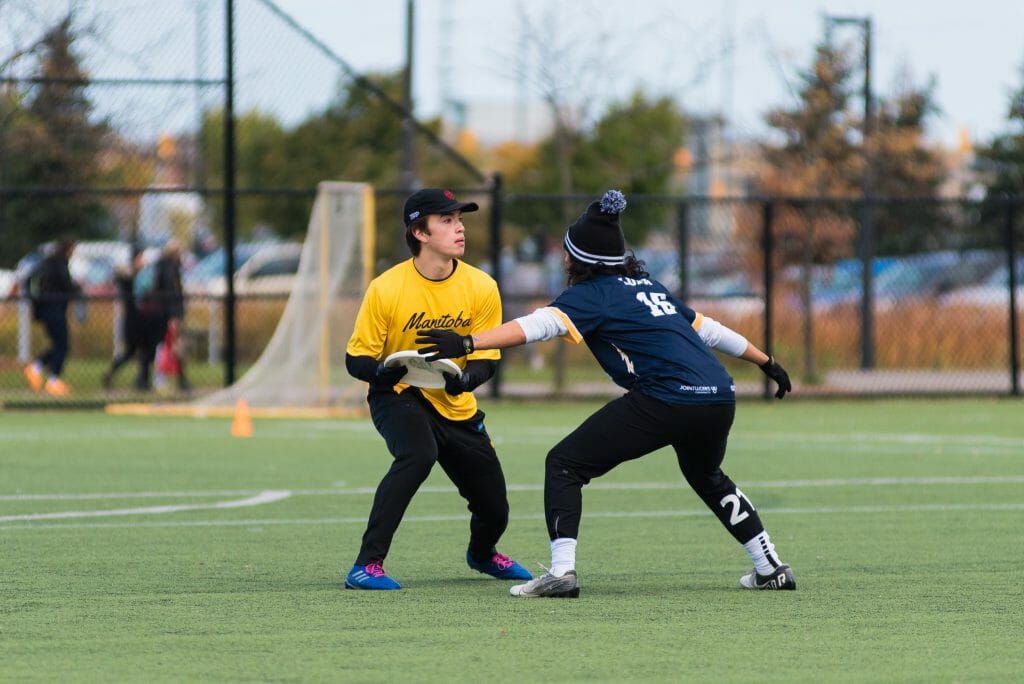
The only person on this list to win two awards, if you don’t know Nick McFaddin’s name by now, you should take note. As the main handler on Mantiboa’s O-line, McFaddin was a vital asset to the system. He was the core of the offense, starting with the initiation plays and always being there when his teammates needed. Despite windy conditions and constant zone looks, his patience and game IQ made it look easy. In one game a teammate said, “It looks like Nick is just playing catch with the rest of O-line.” Indeed, he often moved the disc as if there were no defenders on him. He was a driving factor in how clean Manitoba’s O possessions looked on a point to point basis, calling many of the schemes and guiding players on a near perfect O-line, including in the final where the team only gave up one break. McFaddin’s smarts and talent resulted in a Finals MVP award.
First Runner-Up
Julien Sénéchal (Montreal)
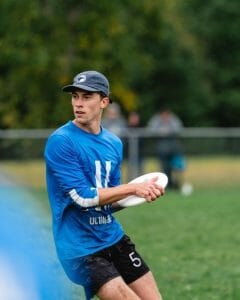
Julien Sénéchal is an upstanding and humble player who played a central role on the offensive line throughout the season. His efficiency and hunger to make the plays Montreal needed led to smart decisions that opened up the offense or created space for his teammates. Sénéchal’s versatility allowed him to play as both a confident handler and an aggressive cutter, while off the field he knew the right time to speak to rally the troops. Gaining experience with the Montreal Royal and Montreal Mephisto, Sénéchal brought his drive into every match as the key offensive piece for his college squad. Sénéchal was an effective and successful playmaker, no matter the pressure, the challenge or the adversity he had to face.
Second Runner-Up
Owen Kolinski (McGill)
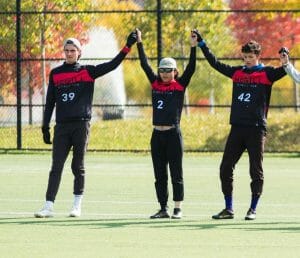
Owen Kolinski is a terrifyingly efficient cutter. A reliable and calming offensive pillar, Kolinski is a welcome addition to any offense, and is good for a layout-D or two after the turnover to boot. At 6’4″ he is a formidable threat deep, but even if you game-plan for his endzone strikes he’ll happily catch an under and tally the assist with his booming flick hucks. A deep threat who can also chuck bombs? Safe to say no defense has an answer for that.
Defensive Player of the Year
Ywan Cohonner (Montreal)
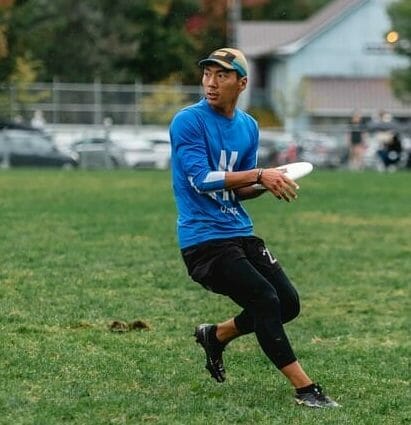
Dominant both horizontally and vertically, Ywan Cohonner was a safe bet defensively and made big plays on several occasions, boosting momentum for the whole team. His power persisted despite playing for long periods of time and regularly covering the best opposing players. In addition to being a defensive game changer, he was also a serious threat on offense after the team got the disc. Cohonner had the disc so often he was effectively a hybrid, seamlessly shifting between his formal cutter role and handling to maneuver the Montreal D-line offense. His defensive reputation precedes itself as he was unanimously selected as the defensive player of the year by his peers.
First Runner-Up
Quinn Wilson (Manitoba)
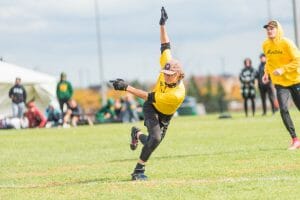
When you’re in an important game and you look across at the other team, it’s always nice to have someone on your team that you know will make life hell for the other team’s top player. For Manitoba, that player is Quinn Wilson. One of the best lockdown defenders at the university level, this guy has a motor that never stops and will use his legs to run matchups into the ground, making them struggle to even collect a dump. And that’s if their opponents can get it out of the endzone: every D point starts with a Wilson pull to the back of the endzone, allowing Manitoba to get down and trap teams. Positionally, he is always in the right spots to not only shut down his own matchup but to make impact plays by providing help to his teammates. If you ever watch a Manitoba game, he’ll be the one getting a crazy layout bid or roofing someone to get the disc back for his team.
Second Runner-Up
Kevin Tong (UBC)
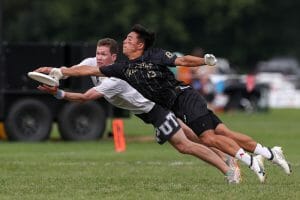
Other team’s best offensive player? No problem, Kevin Tong has them on lockdown. He brings a level of defensive intensity that propels UBC’s D-line to energetic breaks. Not only does he lock down his check but he’s also big in the air and gets timely layout blocks. If you’ve watched Vancouver Red Flag over the past two seasons, you’ll see why Kevin has earned this spot: he consistently neutralizes the other team’s best player and then strikes deep for the score. Deservedly lauded for his defensive tenacity, Tong is also known for his huge chest- and fist-pump celebrations after he gets blocks, hyping up his entire team.
Rookie of the Year
Martin Gallant (Ottawa)
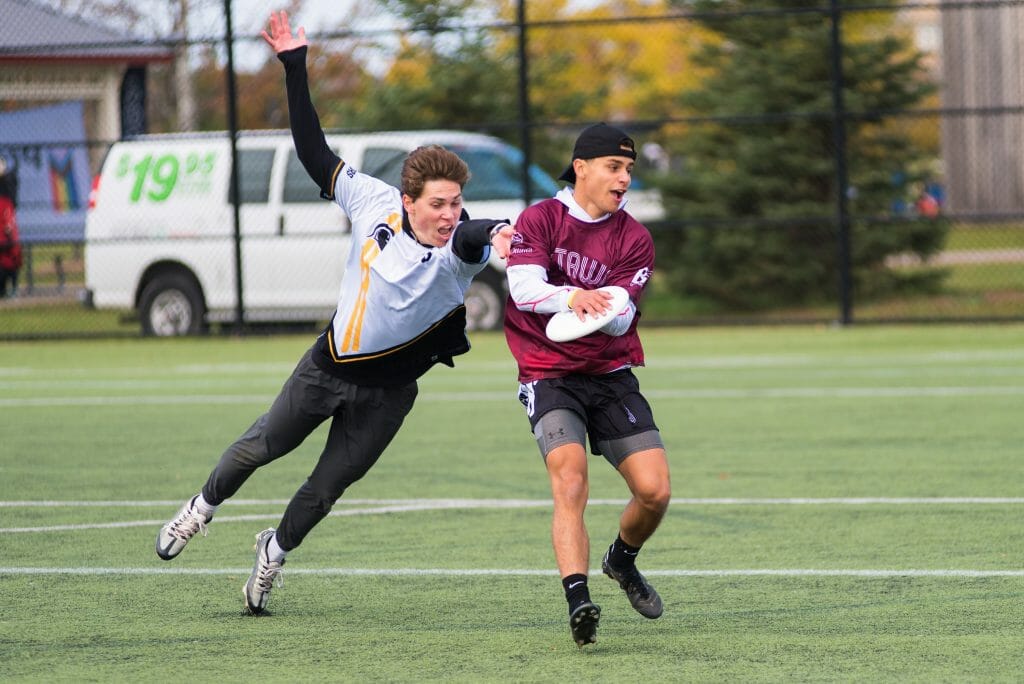
It’s not often you can bring in a rookie and trust him in all areas of the field, but they must build them differently in Moncton. Fresh off two cycles of Team Canada U20, two adult club seasons, and an AUDL season at just 19 years old, Marty Gallant established himself as one of the most dynamic rookies in the open college division. Gallant’s exceptional abilities on both sides of the disc made him a lethal weapon on the field. Add to this exceptional play the energy and passion he brings and you get a winning combination and a piece that Ottawa can build around for years to come. Expect Ottawa to be right around the podium once again next fall with Gallant a big reason why.
First Runner-Up
Dax Miller (Queen’s)

Dax Miller was one of the most hyped rookies coming into September and he delivered with huge plays on both sides of the disc all season long. He has inch-perfect hucks, shifty reset moves, massive skies, and dominating defensive marks. What you may have missed from just watching a game was his calm presence in huddles, steady focus on the line, and excitement to take on big moments. Another U20 player that is just getting started, keep an eye out for him not only to make waves here in the college division but the club scene as well. With at least three more seasons in a Queen’s uniform you know other teams are shaking in their boots as they try to figure out a way to stop the tall lefty handler.
Second Runner-Up
Aidan McKibben (McGill)
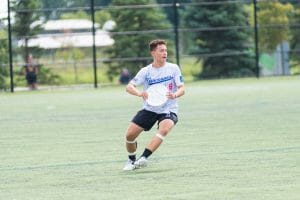
The future of Canadian ultimate continues to be bright as a third U20 member from 2022 cracks the list. Coming from the silver medalist Vancouver Eclipse junior open team, Aidan McKibben quickly adjusted to the heightened athleticism and skill required in the college game. After a strong U20 cycle, McKibben finished his juniors career on a high point and just kept climbing. He was able to immediately slot into the roster in his first year and consistently produce on both sides of the disc for MUT. His massive pulls, technically sound defense, and maturity with the disc are all tremendous assets to whatever team he plays for. This coachable young athlete has a bright future ahead of him.
Huckin’ Heart Award
Will Dickson (Queen’s)
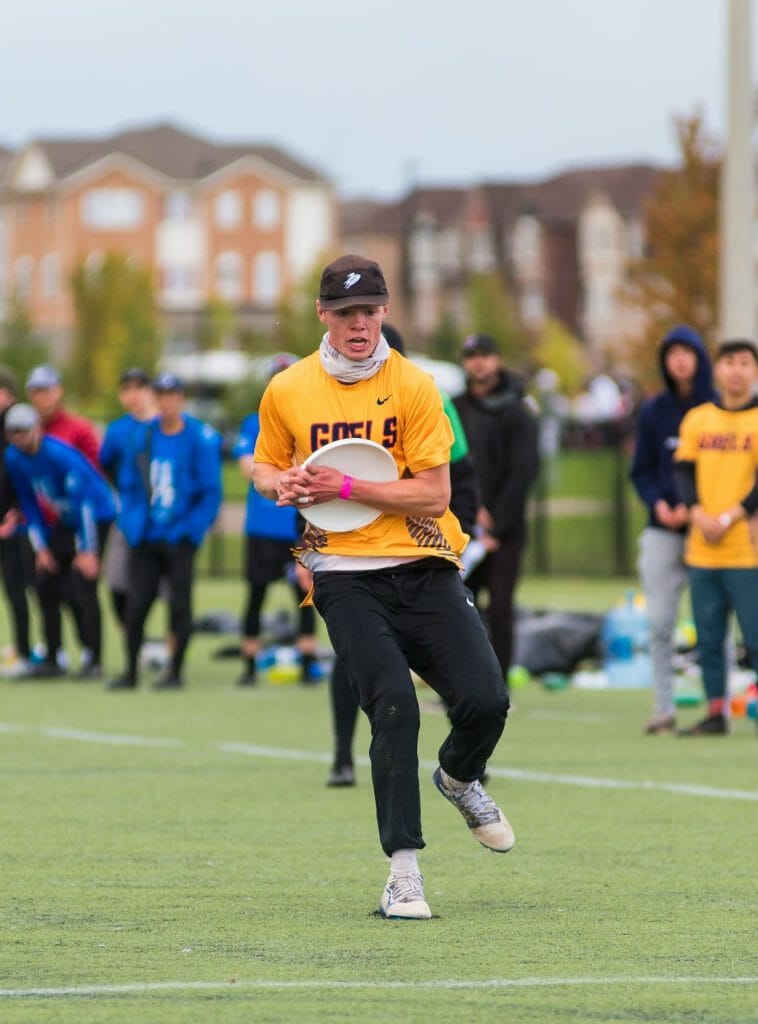
The Huckin’ Heart Award recognizes players who show heart and passion for the sport of ultimate.
With over four years in the Queen’s program, Will Dickson has always worn his heart on his sleeve and given every ounce of energy to every point, game, tournament, and season. In the past it was this intensity that raised the bar and brought out the best performances from his teammates. It continued this season, but as a captain he paired this high intensity with a focus on connecting with teammates, providing direction, and celebrating everyone’s success. This was most clear at Nationals, when in high pressure moments Dickson wasn’t concerned about his own playing time, but rather getting the seven on the line with the best chance of winning their matchups. He made sure the younger athletes had opportunities to experience those big moments, too. The Huckin’ Heart is not just about the energy and commitment, but showcasing passion for teammates, opponents, and sport. There is no better example of that than Will Dickson and for that he is our inaugural winner of the Huckin’ Heart award.
First Runner-Up
Desmond Staples (Ottawa)
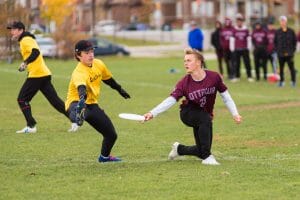
Desmond Staples has been a leader for the Gee-Gees for years and dedicated a massive amount of time and energy to ultimate. Staples knew how well Ottawa could do this year and put his all into making it happen. Always one of the first at practice and last to leave, he would bring plays and concepts that he was “thinking about last night” to almost every practice and pushed every player on the field to be better week in and week out. Not only that, but when the team’s season was on the line, Staples stood up to the challenge and played some of the best ultimate of his life because of how badly he wanted to bring Ottawa to their first-ever national championship. He will go down as one of the most passionate and dedicated Gee-Gees’ captains of all time. Staples will forever be known for “the catch”, a layout endzone grab on universe to send Ottawa to the national final.
Second Runner-Up
James Carr-Pries (Waterloo)

Perhaps the biggest disappointment for the University of Waterloo going into CUUC was the absence of half of the dominator offense: James Carr-Pries. He was sidelined from the big stage after suffering a concussion at the Team Canada U24 training camp the weekend before. While his presence was greatly missed on the field, he was an incomparable asset on the sideline, offering tips and pointers to all between points which resulted in noticeable improvements throughout games. He channeled his unparalleled energy and love for the sport through the sideline which tirelessly talked to the players on the field, stopped rolling pulls, and got the team fired up on breaks and long points. His passion for the Waterloo ultimate program is unparalleled and he leaves a legacy of intensity and energy that few can match.
Coach of the Year Award
Luke Phelan (Ottawa)
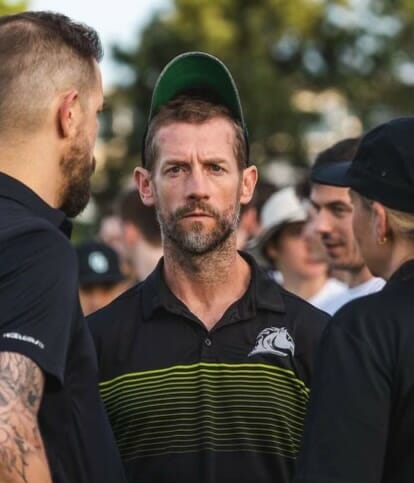
Luke Phelan joined the team in 2021 and over the past two seasons has helped the Ottawa program reach new and unseen heights. He took a team that had never won a Division 2 championship (let alone qualified for Division 1) to a national final appearance. Phelan’s tremendous passion for the team this season shone through as the sole coaching brains behind the operation. His ability to take a group of young ultimate players and guide them into a cohesive unit that can go toe-to-toe with any team in the country is second to none. Throughout the ups and downs of the past two seasons, Phelan’s leadership and confidence in his team to get the job done when it matters most was unwavering. Ottawa couldn’t have accomplished half its goals without Phelan’s coaching brilliance.
First Runner-Up
Quinn Snider (Manitoba)
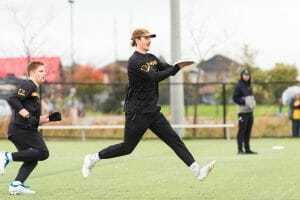
As a Manitoba player last year, Quinn Snider experienced first-hand their tough semi-final loss to Université de Montréal. He offered to coach at the beginning of the year and, when the team took a vote, the decision was a resounding yes. Snider is a special player, but one of the biggest assets he brings to the table is his mind. He’s been in nearly every situation, with experience on the world stage as well as in the AUDL, and knows exactly what to do and say to get the most out of the team. After a down moment early in the tournament – a loss to McGill – Snider’s mentorship helped the team bounce back, leading them to two commanding victories later in the same day. The team carried this momentum to elimination day where they rewrote the script and defeated Montreal in the semifinal, a feat that certainly could not have been done without Snider’s leadership. It was his knowledge and wisdom that helped guide the Manitoba side to another national championship.
Second Runner-Up
Malik Auger-Semmar and Philippe Poitras (Montreal)
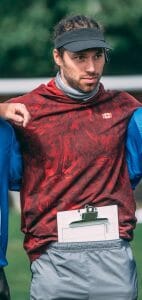
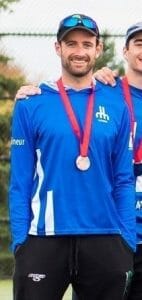
Malik Auger-Semmar and Philippe Poitras co-coached Université de Montréal to a bronze medal finish this season. Auger-Semmar has been a recognizable face in Canadian ultimate for a while, playing with Team Canada at the World Championships, in the AUDL with the Montreal Royal, and with Mephisto, the Montreal open team, in the summer. Poitras meanwhile played with BoD, EPOQ and Battleship before setting his sights on coaching, leading Rage out of Montreal and at the CEGEP level. Going into the season, the co-coaches wanted the players to compete with confidence in a positive, inclusive, and empowering atmosphere. Their goals were to perform and win games with integrity and humility and as a duo, they were in sync. Despite a tough loss on universe point to Manitoba in the semifinal, Auger-Semmar and Poitras helped rally their team to a bronze medal win.